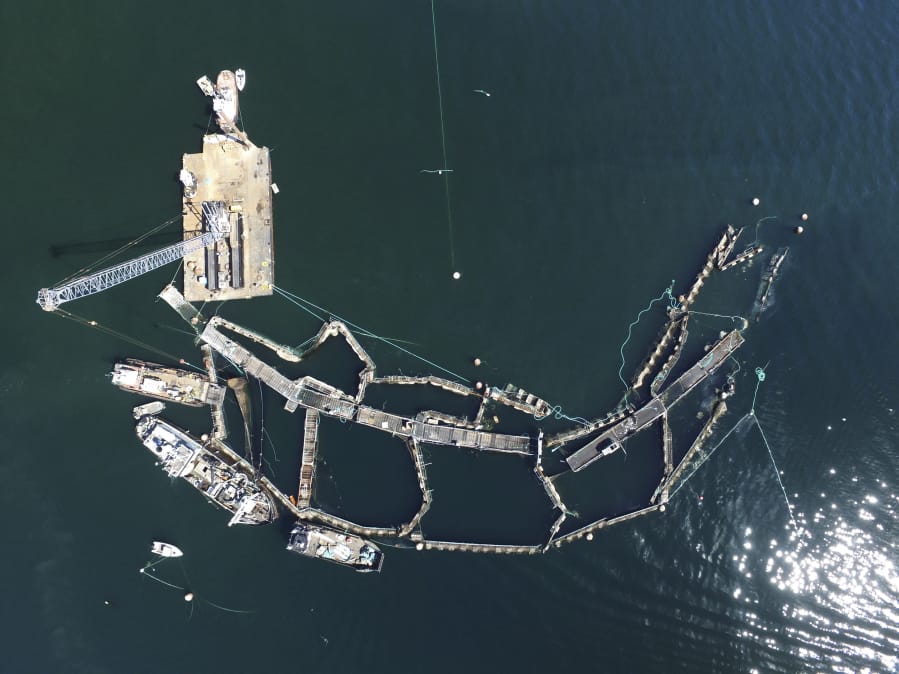SEATTLE — Last month, a net pen used for fish farming and operated by Cooke Aquaculture Pacific began to dip below the surface off Bainbridge Island.
A hole in a pontoon left the structure’s southeast corner partially submerged. Repairs were eventually made.
But now as Cooke seeks to farm steelhead trout — instead of the nonnative Atlantic salmon that state law will soon ban — the incident has caught the attention of state regulators.
The events recalled the hectic summer of 2017, when hundreds of thousands of Atlantic salmon escaped a similar Cooke structure in the Salish Sea. Tribal fishers described it as a “devastation.” Wildlife officials called for open season on escapees. The state’s Department of Natural Resources eventually terminated some Cooke leases and its ecology department fined the company $332,000 over water-quality violations, before the state Legislature in March 2018 voted to phase out the farming of nonnative fish — including Atlantic salmon — in Washington waters.
No fish escaped from the pen last month, according to Joe Smillie, DNR spokesman. The site still hosts Atlantic salmon, but they were in pens unaffected by the leak. Divers repaired a dime-sized hole in the pontoon. DNR is investigating.
For critics, however, the partially submerged pen was pink meat in their fight over fish farming.
“Risky business,” said Kurt Beardslee, of the Wild Fish Conservancy.
“They’re interfering in our fishing areas,” said Merle Jefferson, executive director of the Lummi Nation’s Natural Resources Department, adding that Cooke was lucky to have avoided another escape.
Cooke must cease raising Atlantic salmon here in 2022. The Washington Department of Fish and Wildlife last month proposed to issue a five-year aquaculture permit to Cooke for steelhead. The proposal is out for public comment through Nov. 22.
As the company pivots, opponents say it faces an uphill battle to gain public trust. The WDFW proposal represents Cooke’s first attempt to convince regulators it can put its troubled past behind and continue farming here.
Cooke has applied to raise mostly sterile steelhead, or seafaring rainbow trout, in floating net pens at seven sites in Washington.
A Pierce County company, Troutlodge, would supply only female fish eggs. Eggs would be subjected to pressure to force them to retain a third set of chromosomes, making the fish triploid and sterile. Troutlodge claims a 99.83 percent sterilization rate, according to environmental documents Cooke filed with WDFW.
As with Atlantic salmon, Cooke plans to feed the fish with pellets in open-air pens. The steelhead would take about 12 to 18 months to grow before they are harvested at a target weight of 7 to 9 pounds.
Cooke needs more permits to begin operations.
At some sites, Cooke would require new aquatic lands leases from DNR. Cooke is suing over DNR’s cancellation of its Port Angeles lease. DNR also canceled its Cypress Island lease.
Cooke must amend water-quality permits with the state Department of Ecology to reflect the proposed change of species. In addition, the company needs another WDFW permit every time it seeks to move fish from hatcheries to pens, said Ken Warheit, supervisor of fish health and molecular genetics for the state.



